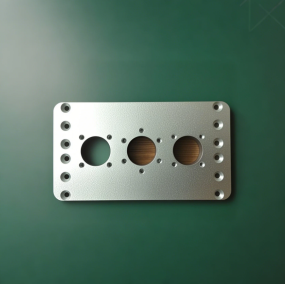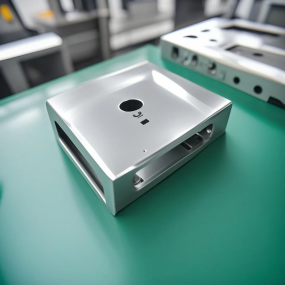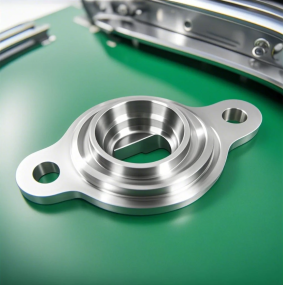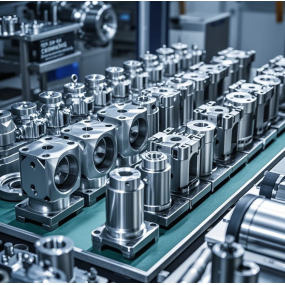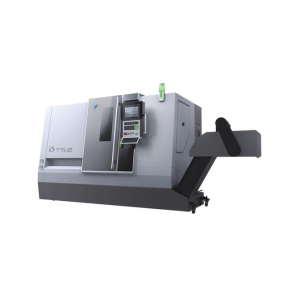In the production process of CNC titanium alloy parts, it has the advantages of high machining accuracy, good material characteristics, high production efficiency, and strong processing ability of complex shapes. The following is the specific introduction: 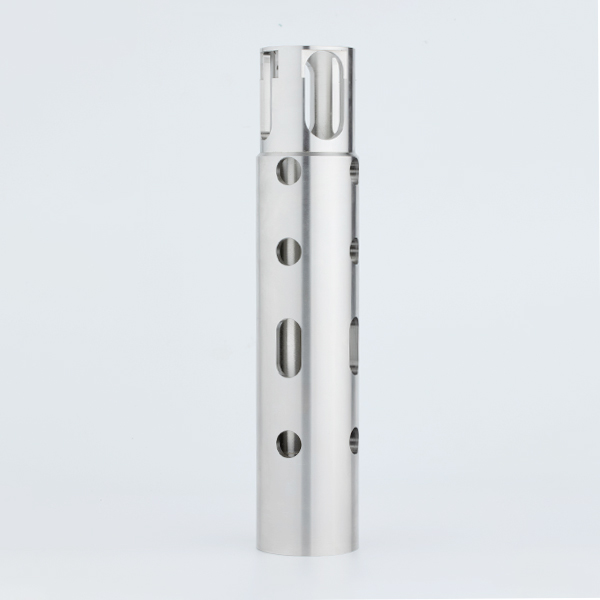 Machining accuracy High dimensional accuracy: CNC Machining equipment can achieve high-precision motion control, and positioning accuracy can usually reach the micron level. For titanium alloy parts that require high dimensional accuracy, such as titanium alloy impellers in aero engines, CNC machining can ensure that the blade size and shape of the impeller meet the design requirements, ensuring the stability and efficiency of the impeller when rotating at high speed. Small form and position tolerances: It can effectively control the shape and position errors of parts. For example, when machining titanium alloy structures, it can control the form and position tolerances such as flatness, verticality, and coaxiality within a very small range, and improve the assembly accuracy and overall performance of parts. Can give full play to the characteristics of titanium alloy materials. High strength maintenance: Titanium alloy has the characteristics of high strength. During CNC machining, through reasonable tool path planning and cutting parameter selection, it can avoid excessive damage to the internal structure of the material, and retain the high strength properties of titanium alloy to the greatest extent, so that the machined parts can operate reliably in a working environment that withstands high stress. Corrosion resistance is not damaged: A dense oxide film will form on the surface of titanium alloy, making it have good corrosion resistance. When CNC machining, the use of suitable cooling lubricant and machining process will not destroy this oxide film, thus ensuring that the parts can still maintain excellent corrosion resistance in various corrosive environments. High Production Efficiency Automated Machining: CNC equipment can realize automated continuous machining, and can complete the machining tasks of multiple processes after one clamping. For mass-produced titanium alloy parts, such as titanium alloy fasteners, CNC machining can be carried out uninterrupted processing according to preset procedures, which greatly improves production efficiency and reduces production costs. Long Tool Life: By optimizing the tool path and cutting parameters, the wear between the tool and the titanium alloy material can be reduced and the tool life can be extended. Advanced tool materials and coating technology can also adapt to the processing requirements of titanium alloys, reduce the number of tool changes, and further improve production efficiency. Complex shape machining ability Strong free-form surface machining: CNC machining has multi-axis linkage function, which can realize the machining of complex free-form surfaces. Aerospace parts like titanium alloys often have complex curved shapes. CNC machining can accurately milling the curved surface according to the design model to meet the pneumatic shape and structural requirements of the parts. Internal structure machining: Various complex structures inside titanium alloy parts can be processed through drilling, milling and other processes, such as cooling channels, weight reduction holes, etc. When machining the titanium alloy casing of an aero engine, it is possible to process complex oil circuit and airway structures inside the casing to meet the working requirements of the engine. Stable processing quality Standardized operation: CNC machining is completely operated according to the pre-prepared program, excluding the interference of human factors. As long as the program and equipment are in stable condition, the quality of the processed titanium alloy parts has a high degree of consistency and stability, which can effectively ensure the reliability of product quality. Real-time monitoring and compensation: Modern CNC machining equipment is equipped with various sensors and monitoring systems, which can monitor the tool wear, workpiece deformation, etc. during processing in real time, and automatically compensate and adjust to ensure that the processing quality is always in a stable state. High material utilization rate Optimized discharge and cutting: Through CNC programming, titanium alloy plates or bars can be optimized for discharge, cutting paths can be rationally planned, and material waste can be reduced. For titanium alloy parts with complex shapes, methods such as nesting cutting can be used to improve material utilization and reduce production costs. Reduce waste generation: Precise machining control can reduce waste generation due to machining errors. Compared with traditional machining methods, CNC machining can more accurately control the amount of cutting and avoid excessive cutting, thereby improving the effective utilization rate of materials.
Machining accuracy High dimensional accuracy: CNC Machining equipment can achieve high-precision motion control, and positioning accuracy can usually reach the micron level. For titanium alloy parts that require high dimensional accuracy, such as titanium alloy impellers in aero engines, CNC machining can ensure that the blade size and shape of the impeller meet the design requirements, ensuring the stability and efficiency of the impeller when rotating at high speed. Small form and position tolerances: It can effectively control the shape and position errors of parts. For example, when machining titanium alloy structures, it can control the form and position tolerances such as flatness, verticality, and coaxiality within a very small range, and improve the assembly accuracy and overall performance of parts. Can give full play to the characteristics of titanium alloy materials. High strength maintenance: Titanium alloy has the characteristics of high strength. During CNC machining, through reasonable tool path planning and cutting parameter selection, it can avoid excessive damage to the internal structure of the material, and retain the high strength properties of titanium alloy to the greatest extent, so that the machined parts can operate reliably in a working environment that withstands high stress. Corrosion resistance is not damaged: A dense oxide film will form on the surface of titanium alloy, making it have good corrosion resistance. When CNC machining, the use of suitable cooling lubricant and machining process will not destroy this oxide film, thus ensuring that the parts can still maintain excellent corrosion resistance in various corrosive environments. High Production Efficiency Automated Machining: CNC equipment can realize automated continuous machining, and can complete the machining tasks of multiple processes after one clamping. For mass-produced titanium alloy parts, such as titanium alloy fasteners, CNC machining can be carried out uninterrupted processing according to preset procedures, which greatly improves production efficiency and reduces production costs. Long Tool Life: By optimizing the tool path and cutting parameters, the wear between the tool and the titanium alloy material can be reduced and the tool life can be extended. Advanced tool materials and coating technology can also adapt to the processing requirements of titanium alloys, reduce the number of tool changes, and further improve production efficiency. Complex shape machining ability Strong free-form surface machining: CNC machining has multi-axis linkage function, which can realize the machining of complex free-form surfaces. Aerospace parts like titanium alloys often have complex curved shapes. CNC machining can accurately milling the curved surface according to the design model to meet the pneumatic shape and structural requirements of the parts. Internal structure machining: Various complex structures inside titanium alloy parts can be processed through drilling, milling and other processes, such as cooling channels, weight reduction holes, etc. When machining the titanium alloy casing of an aero engine, it is possible to process complex oil circuit and airway structures inside the casing to meet the working requirements of the engine. Stable processing quality Standardized operation: CNC machining is completely operated according to the pre-prepared program, excluding the interference of human factors. As long as the program and equipment are in stable condition, the quality of the processed titanium alloy parts has a high degree of consistency and stability, which can effectively ensure the reliability of product quality. Real-time monitoring and compensation: Modern CNC machining equipment is equipped with various sensors and monitoring systems, which can monitor the tool wear, workpiece deformation, etc. during processing in real time, and automatically compensate and adjust to ensure that the processing quality is always in a stable state. High material utilization rate Optimized discharge and cutting: Through CNC programming, titanium alloy plates or bars can be optimized for discharge, cutting paths can be rationally planned, and material waste can be reduced. For titanium alloy parts with complex shapes, methods such as nesting cutting can be used to improve material utilization and reduce production costs. Reduce waste generation: Precise machining control can reduce waste generation due to machining errors. Compared with traditional machining methods, CNC machining can more accurately control the amount of cutting and avoid excessive cutting, thereby improving the effective utilization rate of materials.
Hello! Welcome to EMAR's website!
 English
English » »
» »
 Spanish
Spanish Arabic
Arabic French
French Portuguese
Portuguese Belarusian
Belarusian Japanese
Japanese Russian
Russian Malay
Malay Icelandic
Icelandic Bulgarian
Bulgarian Azerbaijani
Azerbaijani Estonian
Estonian Irish
Irish Polish
Polish Persian
Persian Boolean
Boolean Danish
Danish German
German Filipino
Filipino Finnish
Finnish Korean
Korean Dutch
Dutch Galician
Galician Catalan
Catalan Czech
Czech Croatian
Croatian Latin
Latin Latvian
Latvian Romanian
Romanian Maltese
Maltese Macedonian
Macedonian Norwegian
Norwegian Swedish
Swedish Serbian
Serbian Slovak
Slovak Slovenian
Slovenian Swahili
Swahili Thai
Thai Turkish
Turkish Welsh
Welsh Urdu
Urdu Ukrainian
Ukrainian Greek
Greek Hungarian
Hungarian Italian
Italian Yiddish
Yiddish Indonesian
Indonesian Vietnamese
Vietnamese Haitian Creole
Haitian Creole Spanish Basque
Spanish Basque


